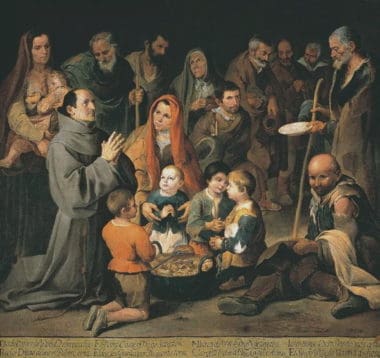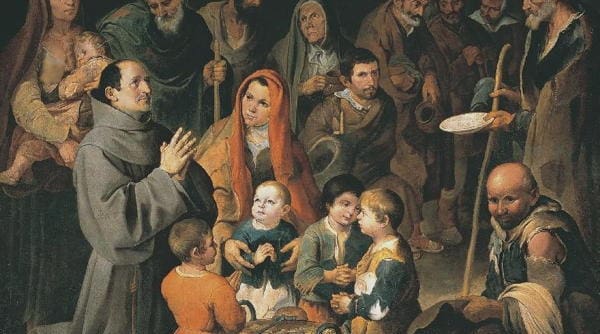Relationships or Activities?
Dear Father John, Is there anything wrong with putting too much emphasis in my passion and or apostolate?
THE INSTRUCTIONS JESUS gave when he sent out the first Christian missionaries included a curious directive: “Whatever town or village you enter, look for a worthy person in it, and stay there until you leave” (Matthew 10:11).
Christian Mission Is about People
The implication is clear: Mission, for a Christian, is primarily about people. The whole history of salvation follows this same pattern. God begins to unfold his plan of redemption by establishing a relationship with the chosen people of Israel, and this relationship becomes the central characteristic of Israel’s very identity.
I will take you as my own people, and I will be your God…. Ever present in your midst, I will be your God, and you will be my people…. You shall be my people, and I will be your God. (Exodus 6:7; Leviticus 26:12; Jeremiah 30:22)
 Through the Incarnation, God elevates his relationship with us to a shocking new level. By taking on human nature, he enables us to interact with him just as we interact with any human friend: “I no longer call you slaves, because a slave does not know what his master is doing. I have called you friends because I have told you everything I have heard from my Father” (John 15:15).
Through the Incarnation, God elevates his relationship with us to a shocking new level. By taking on human nature, he enables us to interact with him just as we interact with any human friend: “I no longer call you slaves, because a slave does not know what his master is doing. I have called you friends because I have told you everything I have heard from my Father” (John 15:15).
Original sin shattered a relationship of trust between God and the human family: “Man, tempted by the devil, let his trust in his Creator die in his heart” (CCC, 397). God originally established that relationship to be the source of meaning and joy for human beings: “Man was made to live in communion with God, in whom he finds happiness” (CCC, 45). And so it makes perfect sense that God’s plan for redeeming us from sin involves reestablishing a real, interpersonal relationship with the human family and each member of it, not simply tweaking a damaged social system or repairing a technical malfunction.
The Real Meaning of Religion
 Whenever we forget the centrality of relationship in the Christian worldview, we play into the hands of critics and cynics who consider religion to be nothing more than empty rituals and soulless formalities. We all know people who have left the Church because of this. They learned how to make the Sign of the Cross; they learned a few answers to questions in Catechism classes; they learned when to stand and sit and kneel during Mass; but they never experienced a personal encounter with God. Jesus remained for them a shadowy historical figure, not a real person passionately interested in their lives.
Whenever we forget the centrality of relationship in the Christian worldview, we play into the hands of critics and cynics who consider religion to be nothing more than empty rituals and soulless formalities. We all know people who have left the Church because of this. They learned how to make the Sign of the Cross; they learned a few answers to questions in Catechism classes; they learned when to stand and sit and kneel during Mass; but they never experienced a personal encounter with God. Jesus remained for them a shadowy historical figure, not a real person passionately interested in their lives.
Developing a personal relationship with God in the context of a community of believers who make up the family of God—this is the real core of true religion. Making this possible was a central part of the radical, revolutionary message of Jesus Christ.
And so, as we strive to find creative ways to spread that message, we have to give priority to relationships. Otherwise, we will end up betraying the very idea we are trying to communicate. Jesus commanded us to “love your neighbor as yourself” (Matthew 22:39). Love means relationship, personal investment, interpersonal knowledge, and mutual esteem. To be Christ’s messengers to the world, his apostles and missionaries, requires us to care enough about the people whom Jesus came to save that we are willing to become vulnerable and enter into relationship with them: “Whatever town or village you enter, look for a worthy person in it, and stay there until you leave” (Matthew 10:11).
Beyond Techniques
Any apostolic activity we engage in should include, or at least be open to, this dimension. Christianity is not a technique that people can learn and apply with clinical precision. Christianity is a network of faith-based relationships that flows outward from a personal encounter with the one, true, Triune God—Father, Son, and Holy Spirit—who is relationship and requires relationship: “Whoever is without love does not know God, for God is love” (1 John 4:8). Our apostolic endeavors have to be conceived and executed from that perspective.
Apostolates like camps, schools, Bible studies, service projects, publishing houses, websites, hospitals, professional associations, conferences, radio shows, formation programs, and even whole parishes are never ends in themselves. Rather, every apostolate is an effort to create an environment or situation in which personal encounters with Christ and among actual or potential members of the Body of Christ have a better chance of happening and flourishing. Apostolic activities are meant to be catalysts that initiate or deepen Christian experience, which is always in some way an experience of God and God’s family.
Avoiding a Tricky Idolatry
And so we must resist the temptation to idolize our apostolates as if the perfect apostolate will be able to conquer evil and usher in a new Golden Age of Christianity. There is no Golden Age, and there never has been. Every period in the history of the Church has had its crises as well as its saints. The age in which we live is no exception. Our Christian mission spurs us on to find creative ways to evangelize, to come up with new apostolates that can expand the reach—both in breadth and in depth—of Christ’s message in our world, but, in the end, they are merely tools. The real heart of evangelization is found not in perfect pastoral programs or killer apps, which are merely useful instruments, but in relationships of love—love for Christ and love for neighbor.
Pope Benedict XVI put this beautifully in his very first encyclical letter, God Is Love:
Love of neighbor is thus shown to be possible in the way proclaimed by the Bible, by Jesus. It consists in the very fact that, in God and with God, I love even the person whom I do not like or even know. This can only take place on the basis of an intimate encounter with God, an encounter which has become a communion of will, even affecting my feelings. Then I learn to look on this other person not simply with my eyes and my feelings, but from the perspective of Jesus Christ. His friend is my friend. Going beyond exterior appearances, I perceive in others an interior desire for a sign of love, of concern. This I can offer them not only through the organizations intended for such purposes, accepting it perhaps as a political necessity. Seeing with the eyes of Christ, I can give to others much more than their outward necessities; I can give them the look of love which they crave.1
“His friend is my friend”—this is the heart of apostolic activity. I want to give to others what Jesus has given to me, and I want to do so because Jesus wants me to. Evangelization is never mechanical; it is never technocratic. It is about people, and relationships, and the living God who is present in all of them.
All people desire to leave a lasting mark. But what endures? Money does not. Even buildings do not, nor books. After a certain time, longer or shorter, all these things disappear. The only thing that lasts forever is the human soul, the human person created by God for eternity…. It is here that appears the dynamism of the life of a Christian, an apostle: I chose you to go forth. We must be enlivened by a holy restlessness: a restlessness to bring to everyone the gift of faith, of friendship with Christ. Truly, the love and friendship of God was given to us so that it might also be shared with others. We have received the faith to give it to others…. And we must bear fruit that will endure.2
1 Pope Benedict XVI, Deus Caritas Est, 18.
2 Joseph Cardinal Ratzinger, homily, April 18, 2005; http://www.vatican.va/gpII/documents/homily-pro-eligendo-pontifice_20050418_en.html.
+
Editor’s Note: Editor’s Note: This is an excerpt from Father John Bartunek’s book “Go! 30 Meditations on How Best to Love Your Neighbor as Yourself” filled with “practical examples and down-to-earth wisdom which will show you how to bring Christ into each facet of your life”. Click here to learn more about the book…or if you wish to get it for a friend or relative who doesn’t read on line.
+
Art: Anunciación (Annunciation), Ludovicus Finsonius, 17th century, PD-US author’s life plus 100 years or less; Saint Didacus [Diego] of Alcalá feeding the poor, Bartolomé Esteban Murillo, 1645-1646, PD-US author’s life plus 100 years or less; God is Love – A cross in a heart formed with candles, photographed by Wingchi Poon, 13 March 2010 own work, CCA-SA 3.0 Unported; all Wikimedia Commons.


